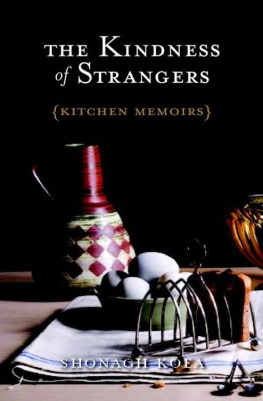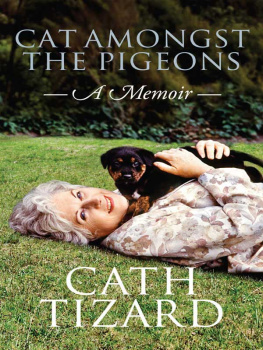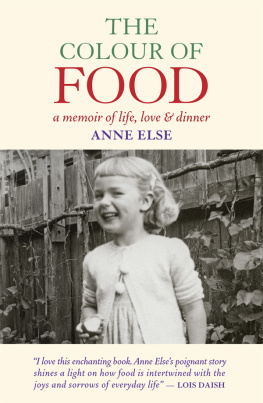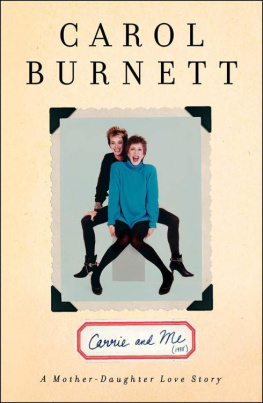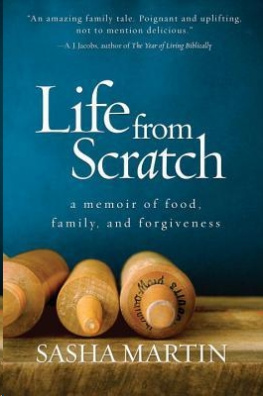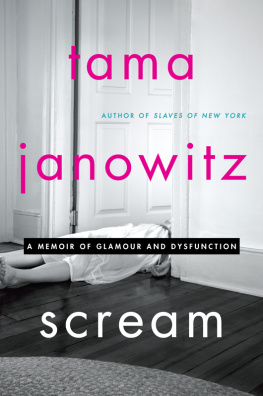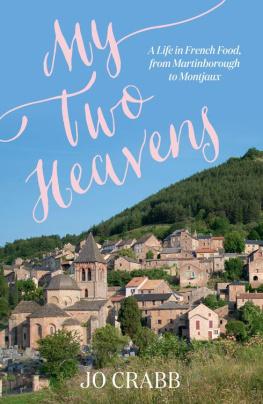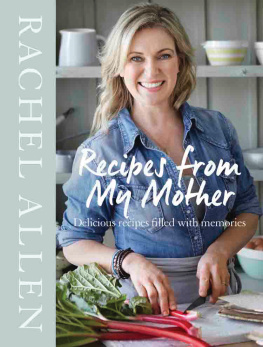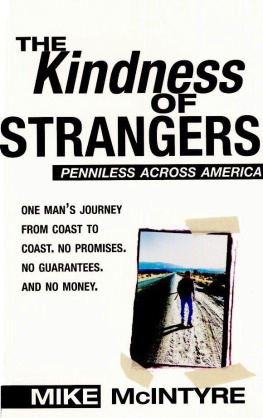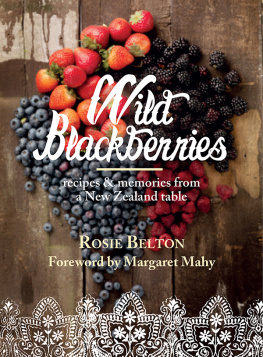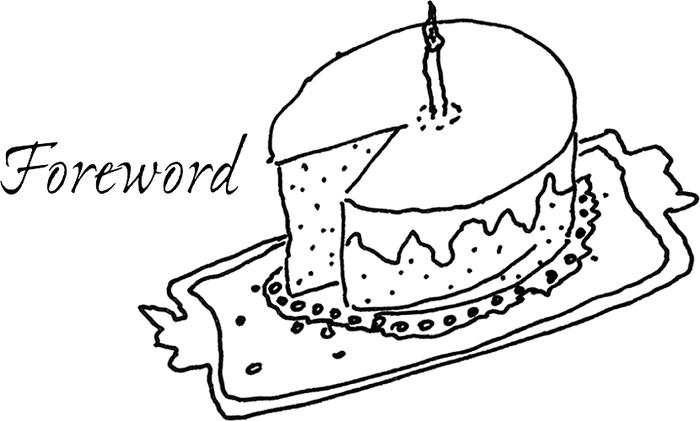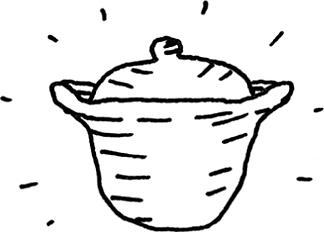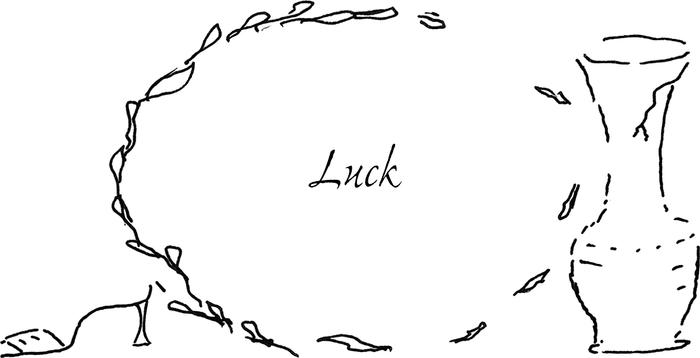Praise for Shonagh Koea
Shonagh Koea has a command of prose, an originality of expression, a sophisticated wit and a richness of imagery which makes her writing a delight. Graeme Lay, North & South.
[Shonagh] has wit and irony but, more than that, she has a remarkable ear and an assured grasp of novel structure, including what Katherine Mansfield called the subtle variation of tense from the present to the past and back again. Ian Gordon, New Zealand Herald.
Shonagh Koea is as addictive as nicotine or coffee with, perhaps, major withdrawal symptoms. Nelson Evening Mail.
Reading Shonagh Koeas stories is like sampling a box of good, rich chocolates. Read (or eat) too many at once and theres a risk of sensual overload; restrict yourself to one or two, and you miss the pleasure of indulgence, and the subtle distinction of each offering. New Zealand Books.
The best of her writing combines the delicacy of Jane Austen with the acridity of Evelyn Waugh. No mean feat. North & South.
Shonagh Koea delivers nothing but pleasure to the reader. Jane Hurley, New Zealand Listener.
Table of Contents
The Kindness of Strangers is a wonderful, sad and moving book. Its the song of a survivor, leavened with humour, pluck and chutzpah.
The facts of Shonagh Koeas life are brief and may be summed up in the ordinary statistics of place and time of birth, parentage, schooling, marriage, motherhood and career. Yet behind these facts is a river of experience and, I think, a kind of wisdom. At one point Shonagh writes of the skeleton of experience emerging out of the dross of existence. This book is the elegant skeleton. Its the product of a lifetimes winnowing, of turning away from painful experiences then turning back for a final look. That she does this with a dry humour and passion and without being judgemental is part of the engaging quality of this memoir with recipes.
If all of life could be said to be a preparation, then this book offers the comfort of food well prepared, a table beautifully set and an excellent raconteur about to launch off on favourite stories: the recipes that saved my life.
Peter Wells
I have had a lucky life. In some ways my life has been very bad, and in others very good. But even in the bad parts I have had a great joy from books and music and paintings and that is why I think I am lucky. If I had not been interested in those things I might have become part of the great sludge of life because that is all I could possibly have hoped for where I came from. If I had perhaps been born into a family where they were educated and thought a lot of education, I might have gone to university and become qualified in some academic field or another. I love libraries so I might have become a librarian. I do not know what might have happened. I might have conformed, but I lived like a quiet wild creature and I just grew how I wanted to grow. I quietly and wildly went my own way and became my own self very young, and I think I was very fortunate to be able to do that. Because I was quiet I was mostly ignored and so I was free. No one had any expectation of me. I had no ones history to embellish nor anything to live up to. I was not from a family where everyone was a doctor or a lawyer or a teacher or an anything. My father was a violent man, my mother was a nice woman but hopeless. I was thus quite free to be anything I liked.
I now think that was a wonderful thing, but at the time it was frightening. If I had known then that everything would turn out sort of all right I would have been less frightened. Possibly I did not have much confidence. That is what could be said now. My father insisted I had to leave school when I was fifteen and go to work at Woolworths, which would have been at the end of the fourth form, but I did not do that. I stayed at school for another two years and I worked at various jobs at various times to buy my school things and the time slowly passed. I just floated along like a leaf in a river and the willows never quite caught me and the mudbanks were never sticky enough to hold me and I just floated along and floated along forever, and that was a very lucky thing.
When I was at intermediate school my mother and father sold the house they had owned and we moved closer to the centre of Hastings. We lived after that in quite a nice California bungalow in a quiet street just off the main street so you could walk into town and that seemed quite an interesting thing to be able to do at that time. It was within walking distance of the library. The other house we had lived in was on the outskirts of town, a long way from the main street and the library. The luckiest thing about that move, for me, was one of the neighbours. The lady who lived next door was a concert pianist and I could hear the loveliest music coming from her house. She used to play over the radio and people would get her to play at musical evenings and soires. Things were more old-fashioned then and those were the kinds of entertainments people had. There were not really dinner parties not that I knew of or cocktail parties. People gave musical evenings and they would get someone to sing and someone to play the piano. So I was suddenly next door to all this music and I found it very interesting. I used to stand outside on our front lawn to hear our neighbour practising and I thought the music was very beautiful. She played quite a lot of Chopin, I think. When I first lived there I thought someone next door was playing records, but after a while I realised I could see the silhouette of a woman, just beyond the sitting-room windows, playing a grand piano. I used to listen, fascinated.
When I went to high school she began to employ me as a babysitter because she and her husband had two little children, and this gave me money with which to go to town and buy myself a few bits and pieces. You could, then, buy a pair of nylon stockings for five and elevenpence (fifty-nine cents today) and once I bought a very nice white nylon petticoat with lace for only twenty-two and sixpence (two dollars, twenty-five cents). Things were different then, and those were the sorts of clothes girls liked. She also used to take me with her to concerts when she had to play, and that was the most interesting and fortunate thing that could have happened to me. My job was to mind her handbag and her car keys and hold her grey squirrel coat in my memory these musical evenings were always in winter and I also had to hold the music in the order in which it was to be played. When we got out of her car at the venue the job would begin. She would start by handing me the car keys. She would say, There you are, Sho dear. I would already be holding all the music in playing order. Once inside there would be a bit of chatter and then she would go to the piano and take off her rings. I was then in charge of the rings as well as the coat she had taken off at the door, the handbag and the music. She had a gold ring with three big diamonds and another antique rose-gold ring with four large pearls and another ring, I think, with a sapphire. I used to mind all these, and I thought they were very pretty. I never put them on, which would perhaps have been an easier way to look after them. I just held them in my hand carefully. When she played I had to stand to her left and turn the music at the last bar at the bottom of each page. I could sight-read music. That was another thing I had learnt. She would nod her head slightly as the time came and I swiftly turned the page. The pianos were usually grands and the music stands had little metal uprights that held the music book in place and I was always afraid that I would catch the bottom of a page on one of these and rip it. There was a kind of knack in turning, and lifting, the page to avoid this. She used to say I was very good and very quiet and very reliable so it was very nice to go out with her and have an evening where everything was pleasant.

